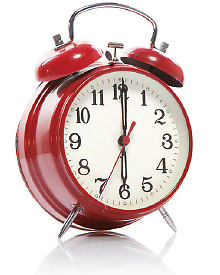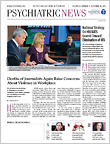To promote optimal health, adults aged 18 to 60 years should sleep seven or more hours per night, a panel of leading sleep experts has concluded. The recommendations, based on a review of thousands of studies assessing the effects of different sleep durations on mental and physical health, were published last month in the journal Sleep and the Journal of Clinical Sleep Medicine.
“It would be a mistake for people to think they need only seven hours of sleep per night,” Nathaniel Watson, M.D., a professor of neurology at the University of Washington, Seattle, and co-director of its sleep medicine center, told Psychiatric News. “Most adults need seven hours at a minimum,” he said. Watson, currently president of the American Academy of Sleep Medicine (AASM), chaired the 15-member panel of sleep specialists selected by AASM and the Sleep Research Society.
More than one-third of the U.S. adult population reports sleeping less than seven hours on average in a 24-hour period, according to the Centers for Disease Control and Prevention (CDC).
The panel found that sleeping less than seven hours per night is associated with increased rates of adverse health outcomes, including weight gain, obesity, diabetes, hypertension, heart disease, stroke, depression, and an increased risk of early death. Averaging less than seven hours of sleep per night also may impair immune function, increase pain, hinder daytime concentration and performance, and boost errors and accidents.
The sleep experts reached their conclusions after examining 5,314 scientific articles published in English on the relationship between sleep duration and health. The group winnowed the list down to 311 papers on the basis of study design, participant number, and other specifications, and divided these into nine categories addressing specific health outcomes.
The panel focused on adults aged 18 to 60 years because epidemiological studies show that this group averages less sleep per night than younger and older age groups do. Older adults also are more likely to have medical disorders that may confound associations between sleep duration and health outcomes.
After reviewing all of the papers, panel members weighed the strength of evidence supporting a recommendation for nightly sleep durations less than five hours, between five and 10 hours, and more than 10 hours. They focused on nightly sleep durations that increased in one-hour increments because most epidemiologic and experimental studies they examined used these amounts.
In the mental health category, the research on the relationship between sleep duration and psychiatric health included observational, experimental, and treatment intervention studies. In these studies, the threshold for self-reported short sleep varied from five to seven hours. Investigators found that short sleep duration was associated with an increased risk of depression, suicidal ideation, and psychological distress.
Although the panel did not recommend an upper limit for nightly sleep, the experts did note that young adults, people recovering from a sleep debt, and people who are ill may need more than nine hours of sleep per night.
The panel’s recommendation addresses nightly sleep, but omits napping, which was not included in most of the epidemiologic studies that were reviewed. Watson noted that shift workers and others with irregular schedules who cannot always sleep at night should aim for at least seven hours of sleep per 24-hour period.
Sleep duration is only one measure of sleep, the panel noted. Sleep timing, quality, day-to-day variability, and sleep disorders also affect health outcomes.
Because sleep needs vary from person to person, Watson recommended that individuals determine the length of nightly sleep they need by going to bed each night when sleepy and waking without an alarm clock for two to three weeks. “When people get as much sleep as they need,” he said, “they feel more alert and energized. They think more clearly and feel more patient. Many aspects of performance improve. People report both better mood and higher quality of life.”
Funding for the review came from the National Healthy Sleep Awareness Project, a partnership between AASM, the Sleep Research Society, and the CDC, to promote the nation’s sleep health. ■
“Joint Consensus Statement of the American Academy of Sleep Medicine and Sleep Research Society on the Recommended Amount of Sleep for a Healthy Adult: Methodology and Discussion” can be accessed
here.

